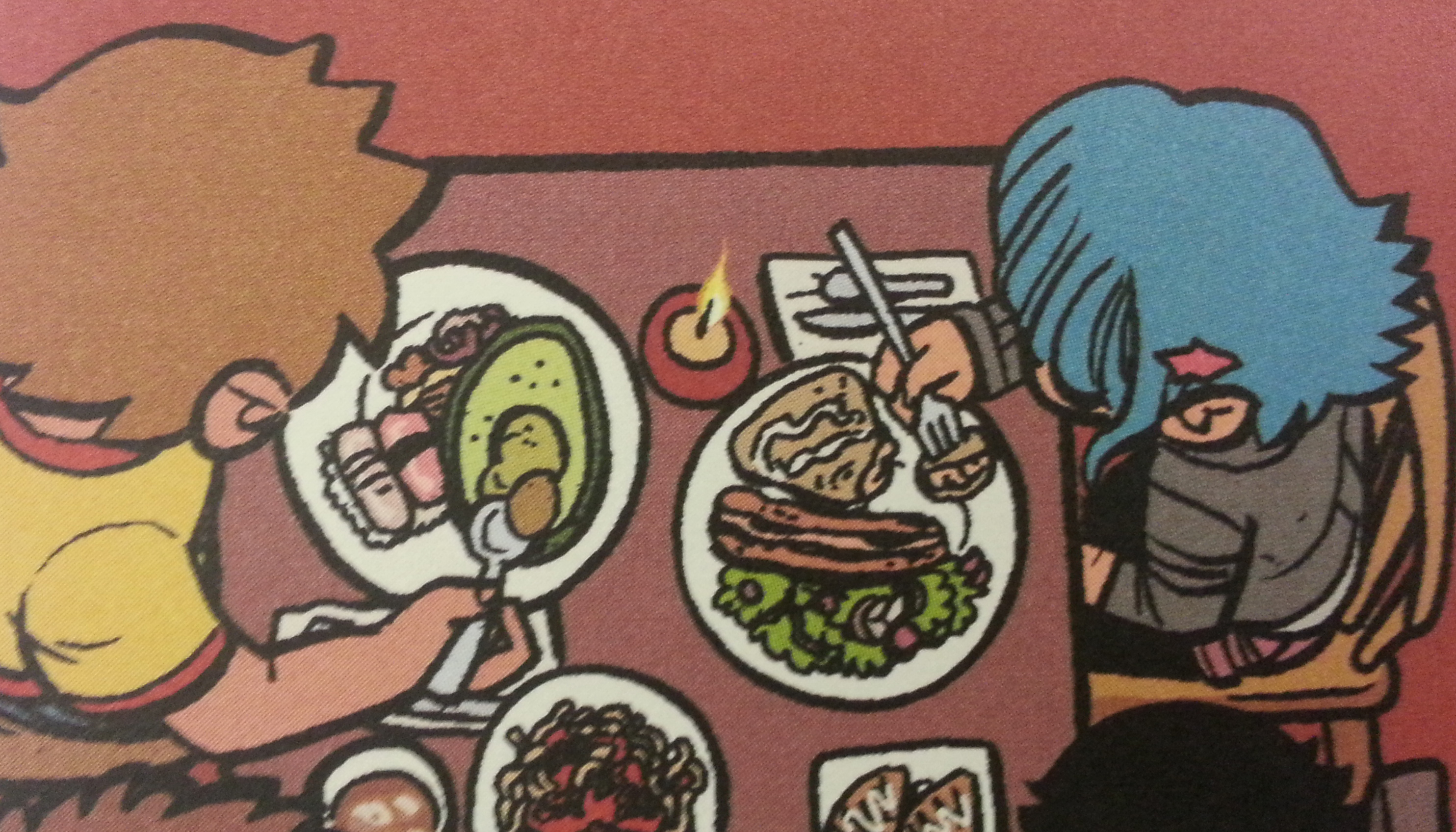Bryan Lee O’Malley’s first collection of graphic novels, the Scott Pilgrim series, took off to incredible heights of success, especially when you consider that they are manga sized and black and white, two features which are only now becoming more popular in the West. Scott Pilgrim became a cult hit because of its combination relatable, heavily flawed characters with video game inspired settings which made every geek reading squeal with pleasure. In his new book Seconds, O’Malley once again presents the reader with relatable characters, albeit this time they are in a fantasy/fairy tale setting.
The story focuses on Katie, a 29 year old chef for whom things are going…okay. It can’t be said that she’s having a hard life – she’s a well-appreciated cook at Seconds, opening a new restaurant all of her own, and she has a little work fling to keep her going in the bedroom department. But there are things she wishes she could change – she could have her long-term boyfriend back instead of losing him to her own secrecy, and the refurbishment of her new restaurant’s building could certainly be going smoother. It’s an entirely understandable state of being.
One night, she wakes in her bedroom above Seconds and sees a ghostly woman with red eyes hunched on her chest of drawers. The cryptic, squirrely girl scratches at her drawers and disappears, but when she checks the drawer later, nothing is in there, not even socks. But later on, while hooking up with her protégé in the larder, an accident causes the quiet new girl Hazel to be burned horribly along her arms. Wracked with guilt and having to sever her relationship with her boy toy, she falls asleep lonely and wakes up to the small blonde girl once again scratching at her drawers. This time when she looks, she finds a small notebook, a red mushroom and a card with printed instructions:
She hurriedly scribbles that she shouldn’t have been with Andrew when Hazel was hurt, consumes the mushroom and goes to sleep.
Armed with foreknowledge, she is able to not just prevent the accident from happening but also endears herself to Hazel by showing she knows that Hazel exists, when otherwise she was universally disliked and ignored for being too attractive and tall. The two of them form a fast bond when Katie discovers that Hazel has been drawing pictures of the ghostly woman from her room, and learns what a “house spirit” is. Hazel’s role as Katie’s guide to the folk tales of house spirits is charming and cute, perhaps because Hazel is an immediately sympathetic character, much more so than the protagonist Katie.
In the grand tradition of fairy tales, Katie is granted this brief power and then takes advantage of the situation. If she could change that event, what else could she change? As most people would agree, once you start righting wrongs it can be difficult to know where to stop, and the noble spirit in which she wrote her first mistake soon gives way to self-indulgent wishes, allowing her to erase hangovers and petty arguments at will. And, like all good fairy tales (in my opinion, of course) it delves easily into horror.
As well as being a morality tale which shows the importance of being careful what you wish for, and the need to consider how your actions affect others, it also has sci-fi elements of alternative timelines. These are represented in the form of a many-branched tree, each with separate twinkling lights in every fork, throughout which reality moves depending on which direction Katie pushes it. As most people find in alternative timelines, even the things that were awful and heartbreaking – in fact, especially those things – are what make us who we are, and by erasing the mistake entirely you could find yourself in an even worse place. Besides, if you change something that defined you, are you the same person? It tows the line beautifully between science fiction and philosophy.
The way O’Malley shows the course of Katie’s life spinning out of control is surreal and disconcerting – what happens when you’ve changed your life so many times is that is begins to unravel around you. Humans aren’t meant to have this power for exactly the reason that abusing it can cause catastrophic consequences, and what’s more the mistakes are where we learn about life.
Bryan Lee O’Malley doesn’t do pin-ups or bizarre artistic effects in his work, but what he is excellent at is portraying real people with real issues and faults. Katie’s self-absorbed, impetuous and sometimes kind of mean, but I get her. Combine this with his excellent sense of humour – Katie’s arguments with the narration which may or may not be in her head – and some well-timed Scott Pilgrim references, and you’ve got a story that’s compelling, thoughtful, sweet, sad and funny all at the same time. As an added bonus, the hardcover book is absolutely beautiful and every page is dripping with the most vibrant of colours and star-scapes.
- This bag looks familiar…
- As do these two!
You can also read the post on the Travelling Man blog if you want a change of scenery!





